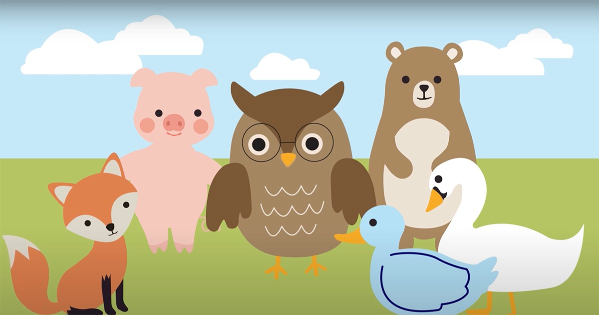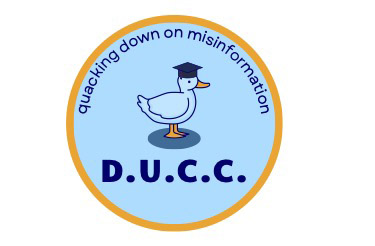Mascots on a Mission

The adorable, colorful animals in the animated video look huggable and cuddly. But these animals are not here for sunshine and play. They tell a story of learning about the harm that comes from judging and excluding the duck among them because of fake information they read online.
A team of eight American University students created the video, along with a social media campaign and a website of materials for educators and families of elementary school students, to teach children about how what they see online is not always true. The video, lessons and materials are age-appropriate and designed for children to understand misinformation so they can identify extremism content online if they are exposed to it.
The students’ work has landed them as one of three finalists in a contest that challenges university students to develop new products, tools or initiatives to prevent terrorism and targeted violence. They chose to focus on children in grades 1 through 4 because they are the group that is “often the most overlooked in counter-terrorism discourse,” according to the students’ research.
“Today, children have uncensored and open access to the internet, leading them to believe everything they see and read online,” said Maya Green, (SPA/BA '24), a team member who built the website and designed and built the guides and lessons plans. “They are at risk of and more susceptible to online radicalization than any other age group. Early-childhood education is the best way to prevent this. Teachers and parents need to be involved and play a role in helping students develop the skills to identify dangerous media online.”
The mainstreaming of hate online is prevalent across the internet. In the wake of the tragic, racist massacre in Buffalo, there are calls for technology companies to do more, as news reports reveal the suspect’s online engagement with racist, hateful content online leading up to the massacre. While an elementary school child may not have the same kind of online access compared to an older youth, they are vulnerable to misinformation in online spaces.
The project, called “Developing and Understanding Critical Comprehension,” or D.U.C.C. as in “duck,” started in the spring interdisciplinary class “Terrorism, Extremism and Education.” The class is taught by Prof. Cynthia Miller-Idriss, a renowned expert on extremist violence, director of AU’s Polarization and Extremism Innovation Lab and professor in the School of Public Affairs and School of Education. The eight students are pursuing majors in the College of Arts & Sciences, School of Public Affairs and School of International Service and several of them are pursuing education as a minor through the School of Education.
 The lab, known as PERIL, tests prevention-based strategies to disrupt radicalization and extremism among youth. In studies and surveys, PERIL’s strategies have been shown to have an impact on users. For example, a toolkit created by PERIL and Southern Poverty Law Center showed parents and caregivers how to recognize the warning signs of youth radicalization. Study results showed parents were more likely to take action about when encountering warning signs after reading the toolkit.
The lab, known as PERIL, tests prevention-based strategies to disrupt radicalization and extremism among youth. In studies and surveys, PERIL’s strategies have been shown to have an impact on users. For example, a toolkit created by PERIL and Southern Poverty Law Center showed parents and caregivers how to recognize the warning signs of youth radicalization. Study results showed parents were more likely to take action about when encountering warning signs after reading the toolkit.
With D.U.C.C., the team has also demonstrated an impact. The team conducted two virtual focus groups in classrooms in Wisconsin after two team members taught lessons to second- and third-graders. According to the team’s results, all 42 students participating in the focus groups learned something new from video and 95 percent of them enjoyed the video. Results also showed that after participating in the lesson activities and watching the video, all students knew misinformation was harmful.
The project exemplifies the approach of engaging parents and teachers to prevent extremism, said Nicholas Caraballo, (SPA/BA '23), an aspiring educator on the team.
“A researcher reached out to us and suggested we do additional videos on topics like disinformation vs. lies. We’re starting to brainstorm what we could do in the future,” he said. “In light of recent events, the country’s at a tipping point. What we’ve been doing is not working. Winning would be an indication that the tides have changed and there has to be a new appreciation and commitment to addressing extremism and targeted violence.”
On June 22 the team will present their work as part of the Invent2Prevent program, initiated in 2021 by EdVenture Partners and the McCain Institute for International Leadership. First place winners receive a $5,000 cash award and entry into a one-year sustainment program. Other students on the team are Molly Sallet, SPA/BA '23, Eliza Costello, CAS/BA ’23, Shihui Hu, SIS/BA,’23, Emily Stingle, SPA/BA '24, Laura Kralicky, SIS/BA ‘22, and Nora Lewis.